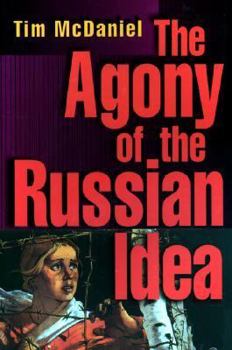The Agony of the Russian Idea
Select Format
Select Condition 
Book Overview
Customer Reviews
Rated 5 starsRequired Reading
This book is required reading for anyone who wants to understand Russia. It highlights elements of Russian political culture that have been present for decades--before, during, and after the Soviet period--and that are still relevant today. Although political culture as an explanatory framework has flaws in general, its power in explaining the Russian political context cannot be disputed.
0Report
Rated 5 starsExcellent but interupted.
I found this book to be exceptional. It gave me an additional view of Russian history albeit based upon the author. My only complaint was of the writer, who seemed to need to impress me with his use of big words that completely and constantly interupted my thought processes during the absorbton of the information that enlightened me greatly. Towards the end of the book I was getting angry at the author for ruining such...
0Report












